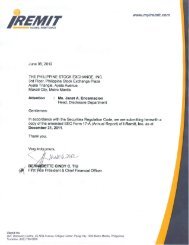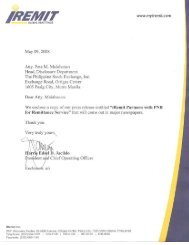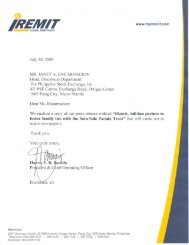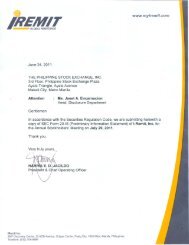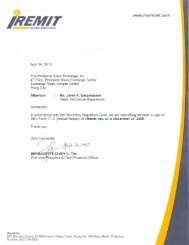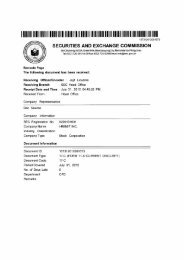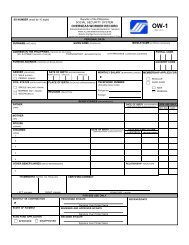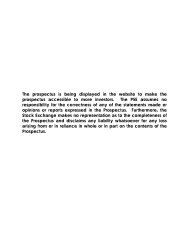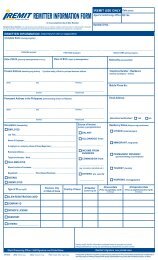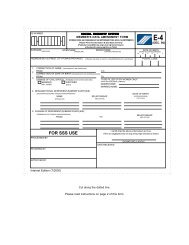SEC Form 20-IS - iRemit Global Remittance
SEC Form 20-IS - iRemit Global Remittance
SEC Form 20-IS - iRemit Global Remittance
Create successful ePaper yourself
Turn your PDF publications into a flip-book with our unique Google optimized e-Paper software.
- 13 -<br />
A change in the ownership interest of a subsidiary, without a loss of control, is accounted for as an<br />
equity transaction. The excess of acquisition cost over the carrying value of the noncontrolling<br />
interest (formerly known as minority interest) is charged against the ‘Capital paid-in excess of par<br />
value’.<br />
When the Parent Company issues more than one class of stock, a separate account is maintained<br />
for each class of stock and the number of shares issued.<br />
‘Retained earnings’ represents accumulated earnings (losses) of the Parent Company less<br />
dividends declared.<br />
Own equity instruments which are reacquired (treasury shares) are recognized at cost and<br />
deducted from equity as ‘Treasury stock’. No gain or loss is recognized in the parent company<br />
statement of income on the purchase, sale, issue or cancellation of the Parent Company’s own<br />
equity instruments. Any difference between the carrying amount and the consideration is<br />
recognized in ‘Capital paid-in excess of par value’.<br />
Dividends<br />
Cash dividends on common shares are recognized as a liability and deducted from equity when<br />
declared and approved by the Board of Directors (BOD) of the Parent Company. Stock dividends<br />
are deducted from equity when declared and approved by the BOD and stockholders of the Parent<br />
Company.<br />
Related party relationships and transactions<br />
Parties are considered to be related if one party has the ability, directly or indirectly, to control the<br />
other party or exercise significant influence over the other party in making financial and operating<br />
decisions. Parties are also considered to be related if they are subject to common control or<br />
common significant influence. Related parties may be individuals or corporate entities.<br />
Provisions<br />
Provisions are recognized when the Parent Company has a present obligation (legal or<br />
constructive) as a result of a past event, it is probable that an outflow of assets embodying<br />
economic benefits will be required to settle the obligation and a reliable estimate can be made of<br />
the amount of the obligation. Where the Parent Company expects a provision to be reimbursed,<br />
the reimbursement is recognized as a separate asset but only when the reimbursement is virtually<br />
certain. The expense relating to any provision is presented in the parent company statement of<br />
income, net of any reimbursement.<br />
Contingencies<br />
Contingent liabilities are not recognized in the parent company financial statements. These are<br />
disclosed unless the possibility of an outflow of resources embodying economic benefits is<br />
remote. A contingent asset is not recognized in the parent company financial statements but<br />
disclosed when an inflow of economic benefits is probable.<br />
Events After the Reporting Period<br />
Post year-end events that provide additional information about the Parent Company’s financial<br />
position at the balance sheet date (adjusting events) are reflected in the parent company financial<br />
statements. Post year-end events that are not adjusting events are disclosed in the notes to the<br />
parent company financial statements when material.<br />
*SGVMC116501*



